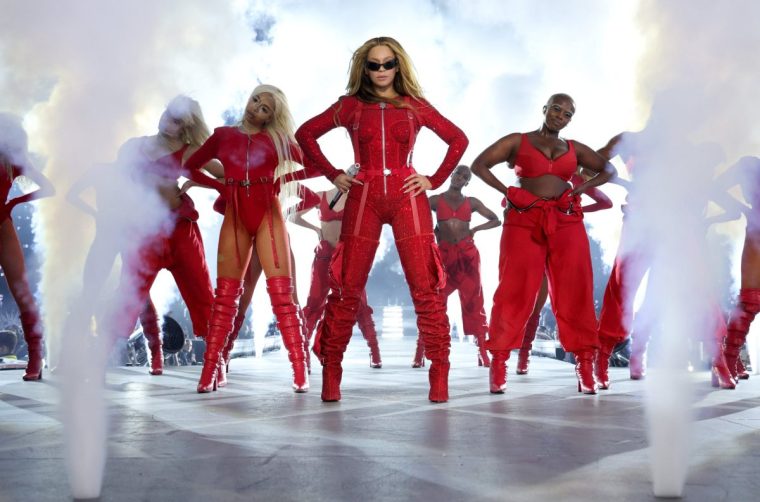One of my most important takeaways from Brat Summer – other than a strange desire to buy a pair of knitted micro-shorts and a vague tinnitus in my right ear – is that nobody can just be an artist anymore. By nobody, I mean women – and by “just” an artist, I mean that their music or their magnetism are rarely the sole object of appreciation by critics and fans. Rather, awe seems to be inspired in equal measure for their abilities in something much more mundane: marketing.
If you have even dipped a toe into pop culture in the past six months or even idly browsed social media, you’ll know what I’m talking about. The consensus is this: Brat isn’t just an album, it’s a feat of marketing genius. Charli XCX isn’t just a pop star, she’s a savvy businesswoman. From the billboards to the newly-released remix album to the font to the Instagram reels, fans have slavishly pored over the details of “the roll-out”, analysing business strategy as feverishly as they might once have interrogated lyrics, and “Brat”, the concept, took on a life of its own online among thousands of people who have probably never listened to the music.
I shouldn’t be surprised. We are more exposed to advertising and spin than ever – not least because the general public have a collective desire to market themselves (and Brat Summer was a very modern campaign in that it allowed people to do just that, by participating in the trend, while also marketing the album at the same time). Yet still I’m struck by how brand strategy, once a topic confined to board meetings, PowerPoint presentations and Slack channels, has become a sexy subject for drinks parties, smoking areas and comments sections. And, as a pop fan, I don’t think I like it.

Charli, who has always been a postmodern experimental artist, is uniquely open about her interest in music’s packaging. In a recent interview with Zane Lowe on Apple Music, she said: “I talk about music in terms of marketing and campaigns more than I do music… It’s the part I’ve always been really interested in.” Listen to any of her early work and you’ll find that it picks apart the pop machine (from the chords to the vocal effects to, yes, the marketing) and exposes and exaggerates it. It seems to me to be a philosophical interest that happens to have real-world benefits for her career.
She’s an outlier in talking openly about her involvement, but increasing interest from the public in this process is a broader trend. Taylor Swift, who became a billionaire last year, is often described as a “business genius” or “entrepreneur”. From the re-records of her albums to her merch to her prolific output to the careful control of her image, everything she does is dissected in terms of “the brand”. Similarly, an interview with Beyoncé for GQ last month, published to promote her new whisky brand, read: “At 43, Beyoncé has shown, time and again, the ability to exert a rare kind of control – over her image, her likeness, her music and business worlds.”
It’s bizarre to me that being an artist, or even a pop star, suddenly seems to be a dirty word without “entrepreneur” or “businesswoman” tacked onto it. An article in Forbes outlining all the business tips we can learn from Swift suggests “there is more to [her] than just her ability to churn out catchy tunes. In fact, Swift is a master of business acumen, possessing a keen sense of strategy”. “Just” her ability to “churn out” catchy tunes?! Swift’s songs, whether you like it or not, are definitive of the past two decades of music, not only for her millions of listeners but in the whole pop canon. Yet more remarkable than that, and how that music has made people feel, is her mastery of business acumen.

Sure – these women must be doing something that their hypothetical shareholders would find pleasing. Brat has been hugely successful in what Charli herself described as temporarily creating a monoculture; we might never escape the connotations of lime green. But what about these women’s creative innovation, their artistry, their magic? And why is it always women who have to market themselves?
An obvious answer to the latter question is that women in pop are claiming autonomy. One of the ways in which Swift is deemed to be business-savvy is in the sheer volume of her output – and her catalogue has almost doubled in recent years since she started re-recording her old albums, which are estimated to generate $8.5m (£6.5m) a month in streaming royalties alone. Yet the re-record project happened so that she had ownership of her music after her label was taken over by a man she loathed. Beyoncé’s “rare kind of control” over her “business world” has been exercised since she fired her father as her manager in 2011, reportedly because he had stolen money from her on a recent tour. In the music industry, which has objectified, sexualised and exploited young women for decades, these can and should be read as feminist decisions.
But pop is both an artistic and commercial industry, and women now dominate the charts because of the complex relationship in modern society between self, sex and sales. I’d never suggest that women having greater control over their own work and image is a bad thing, but expectations of “empowerment” and self-ownership can quickly become new ways of pressurising women to achieve something that men simply don’t have to think about. Harry Styles, for example, one of the only equivalent male acts in recent times, is a great example of a pop project that is almost 100 per cent marketing – and yet nobody is talking about his “business savviness”. They’re talking about his charm and charisma – while someone else is (very successfully) plugging away at his PR.

It feels naïve to praise women for maintaining a “careful control” of their image as though it’s a free choice: we should know by now that if they didn’t, they’d be subject to even more misogyny. If a woman loses control, or exerts it in the wrong way, she risks her status in the industry. Ariana Grande, for example, is not touted as a business genius – she’s now known as a homewrecker. Could this be because she was a child star who has seemingly always been pushed and pulled into various shapes by other people, thus losing our respect?
On the flipside, Chappell Roan is an artist who seems completely dedicated to her creative project, recently telling Rolling Stone she has no interest in brand deals, but has been criticised for choosing not to participate in elements of the industry (such as succumbing to crazed fan behaviour or performing no matter what) that are seen to drive commercial success. Nobody’s calling her a marketing whizz – but people are saying, despite the fact that she has written the best pop album of the decade so far, that she might not be cut out for the job.
If you’ve listened to Brat you’ll know that “Everything Is Romantic” – and it’s easy to see how, in the age of the personal brand, business decisions can be perceived as part of an artist’s quest to realise their true self – and vice versa. When the artist is the product, the boundaries are so blurred between the commercial and the personal that there is little perceptible difference between the two. Fans can fetishise their idols’ business strategy as being a crucial part of the person, not the product. Charli has talked about how Brat is her most authentic record: the one where she’s held back the least, where she spared nothing, which represents her truly as an artist. That it’s been her most commercially successful, too – and that Swift and Beyoncé have become inordinately wealthy through projecting an air of authentic self-possession – surely isn’t a coincidence.
Yet the romantic in me also wonders if obsessing over business decisions doesn’t obscure the reason we connect with these artists in the first place – their music – and also perpetuate the idea that a woman’s success is always a result of scheming and strategising rather than artistry. It feels quaint, almost naïve, to suggest that Swift’s monstrous success is primarily because of her prodigious songwriting talent and innate superstar quality. It feels doubly so to wager that Brat is brilliant because it combines infectious dance music with the avant-garde, that it’s extremely creatively daring, that it’s innovative and original and emotive. That’s not to say that the colour of its cover isn’t significant, or that its publicity campaign hasn’t been hugely important for its success – but I would say that its substance is more important, and definitely more interesting.
But then, in an individualist age, that might be seen as threatening. We have been fed the idea that we are all capable of anything, if only we maximise our potential and work, work, work. An ability to write songs, to connect with an audience, to write searing lyrics or put together beautiful chords are not available to everyone – cannot be explained by “work ethic” or “a passion for your craft” – so they are becoming less valued characteristics. Talent has been relegated to being on a par not only with commercial success but with stars’ personal ability to hustle. The way to get noticed as a budding singer is to build a profile on TikTok, which not only involves being good at singing but having enormous capacity for self-promotion.
This is not to say that talent alone is enough, or that hard work isn’t essential. Success in music has always required a lot of work and even more luck. It is telling that what we value is slowly but steadily shifting towards something we can control – work – and something we can measure – business – rather than the artistic qualities that are difficult to quantify. But by becoming overly preoccupied with that packaging process as fans – of Charli, Taylor or anyone else – we are putting distance between ourselves and the music, which plays on, steadily, in the background.















